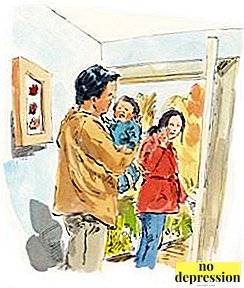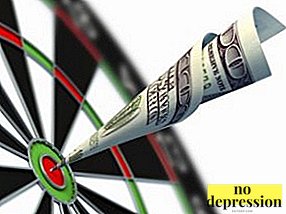 The birth of a child is a miracle. This process is praised for thousands of years and is considered one of the most important in the life of women. The newborn is shrouded in a cloud of unconditional love from the first minutes of its birth, and the euphoria reaches into space. All the women of the world live in this great and insidious tale, true to only a third. Yes, you will love your baby. Yes, the birth of a child will remain in your memory a miracle and joy. But after giving birth to a child, it becomes difficult for many women, and often it doesn’t matter which one the child is first or fifth. Depression covers as a wave with a head and does not allow to breathe and love freely. The whole world is reduced to the size of one square meter, filled with the cry of a child and all the fatigue of the world. No exit. There is no power and meaning to escape. We tell what is postpartum depression and how to treat it.
The birth of a child is a miracle. This process is praised for thousands of years and is considered one of the most important in the life of women. The newborn is shrouded in a cloud of unconditional love from the first minutes of its birth, and the euphoria reaches into space. All the women of the world live in this great and insidious tale, true to only a third. Yes, you will love your baby. Yes, the birth of a child will remain in your memory a miracle and joy. But after giving birth to a child, it becomes difficult for many women, and often it doesn’t matter which one the child is first or fifth. Depression covers as a wave with a head and does not allow to breathe and love freely. The whole world is reduced to the size of one square meter, filled with the cry of a child and all the fatigue of the world. No exit. There is no power and meaning to escape. We tell what is postpartum depression and how to treat it.
What is postpartum depression.
Postnatal or postpartum depression is a type of psycho-emotional disorder that occurs after childbirth. According to statistics, postpartum depression affects 13% of mothers, which adversely affects the mental and physiological health of the child and mother. Depression can last from a couple of weeks to a year or more.
Postpartum depression, like any other depression, is accompanied by physiological manifestations, in particular, the production of joy hormones is disturbed. The coefficient of a woman’s deterioration is household workload and lack of help from relatives.
Postpartum depression is not just bad thoughts or sadness from evening to evening. This is a black hole into which all the emotional and physical resources of a woman fly. New resources are formed very slowly and often are not formed at all. While caring for an infant, women lose access to what was their mainstay and source of strength and inspiration for life.
Without access to resources, without restoring rest and normal human communication and support, depression captures the entire consciousness and often takes on a difficult form.
Symptoms and stages of the disease.
Postpartum depression is recorded in the International Classification of Diseases ICD-10 under the code F53 "Mental disorders and behavioral disorders associated with the postpartum period, not classified elsewhere." The diagnosis is established if the condition and symptoms of the woman worsens during 6 weeks after delivery.
A woman who hides in the closet from her own children and sobs, dreaming of throwing herself out the window or throwing her own children out the window is not fiction. The health of the young mother and the health of the newborn will depend on the stage at which the mental disorder is detected.
Postpartum depression is a psychiatric disease that is quite successfully treated by general practitioners and psychiatrists. In order to establish the presence of postnatal depression in a new mother, experts pay attention to the following symptoms:
Mood swings
Emotional instability, outbursts of anger, irritation, despair. The woman is constantly in a depressed state, often crying for no apparent reason, she is annoyed by domestic problems, the husband, the crying and the screams of the child. She does not leave a feeling of loneliness and uselessness; it seems that the whole world is against it. This is the first manifestation of the onset of the disease, at this stage it is necessary to seek help.

Panic attacks or fear for the life and health of the child
Feelings of helplessness, guilt, and depression due to any minor problem or failure. A woman begins to reproach herself for failure, she thinks that she is a terrible mother and wife. Thoughts about life and the future become gloomy, suicidal tendencies may appear.
Constant breakdown and mood
Fatigue, gloominess, a sense of desolation and self-worthlessness, unwillingness to take any action, to take help from others. A woman becomes detached, does not make contact, or does it very reluctantly and remotely. There is no strength and desire to do even basic things - to care for oneself, for a child, to do household chores.
Aggressive behavior, conflict, attacks of hysteria
Quite alarming symptoms that require expert advice. Relatives and relatives often have no real idea about the reasons for the change in behavior. The young mother goes to the contact extremely reluctant, responds sharply and rudely, provokes scandals, psyche.
Deterioration of general well-being
Disorders of appetite, sleep disturbances up to insomnia, anxiety; in more advanced cases, panic attacks with increased heart rate, sweating, nausea and other autonomic disorders are possible. A simple conversation with a young mother can end in screams and scandals. A woman is capable of unpredictable and thoughtless actions, can unknowingly harm the baby. The most difficult and disturbing stage, requiring immediate psychological and medical assistance.
Disorder or complete lack of sex life
Intimacy with a spouse causes fear or disgust.
In addition to the above symptoms, there may be a general decrease in immunity, which is accompanied by frequent colds, a complete loss of interest in social life - detachment from communication with relatives and friends, isolation in the walls of the house; a change in attitude towards the newborn — either hyper-care or obsession, or complete indifference and unwillingness to contact the child.
If there is one or two similar symptoms, then this may indicate an ordinary fatigue - in this case, a good rest will be enough. But if there are already three or more symptoms, this already indicates a problem in the mental state of the mother. In this case, it is desirable to immediately seek the help of specialists.
 What to do?
What to do?
Postpartum depression is dangerous because it is difficult for women to recognize the disease on the background of general fatigue. As a rule, anxious symptoms fix family and friends. At the first manifestations of depression is necessary:
- Talk about the problem. Recognize that you or your closest woman is likely to develop or have developed postpartum depression.
- To do everything possible to ensure that the woman has a full and rejuvenating rest.
- Visit a psychotherapist to confirm the diagnosis and prescription of treatment
- Adhere to the treatment of depression and treat yourself very carefully!
- Sometimes the symptoms of depression are severe fatigue, because the brain without a quality rest does not work in a healthy mode, so it is important to increase the amount of rest and reduce stressful situations. Symptoms of fatigue will subside on their own with the right response, but depression may remain with you for a long time, if not taken urgent measures of treatment.
In addition to psychotherapy and, possibly, medications (do not worry, there are special antidepressants that are allowed during breastfeeding!), Postpartum depression can be reduced by the following methods:
Walks in the open air
Useful especially as they restore and refresh
Healthy sleep
In peace and quiet. It is desirable away from the cries of children and at least 8-10 hours a day. Even with small children it is possible. Remember that now your health and your baby's health depends on it.
Yoga, stretching, breathing practices
With young children, there is not always time for full-fledged sports training, but simple stretching exercises and a couple of yoga poses will not take much time and effort, but it will help the brain to restructure work on the production of the joy hormone. And the body will thank you so much!
Healthy and healthy food
With depression after the birth of children, the appetite for fast carbohydrates (buns, pasta, chocolates, cookies) often increases, as they give the brain a quick and affordable pleasure. Bad food can only make you worse. We recommend eating healthy and tasty food! But without fanaticism, to indulge yourself with a cake every few days is not a sin, but a vital necessity!

Meditation
Calm and conscious breathing for at least 10 minutes a day is the prevention of mental disorders number one. Sit comfortably and concentrate on breathing. Thoughts calm down, emotions calm down, you will become calmer and easier.
Creative expression of emotions
Anything important to the joy of yourself. Draw, cut, sing and so on. Expel overload from depression.
Support and communication
No preachers of the patriarchate, educators of alpha-wives-mothers (did you, on maternity leave, launch yourself ??), coaches for your own business from home if you have young children. Beware of whiners that parasitize your negative emotions. Communicate with those who love you just like that. Tell me you are going through difficult times. Warm and empathic people - this is your company for the treatment of depression.
Do not underestimate the postpartum depression and its attendant symptoms. Only the attention and care of relatives can save a young mother and baby from excessive stress and its negative consequences. At the slightest suspicion of a problem, you should immediately consult with a specialist.

 What to do?
What to do?

